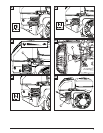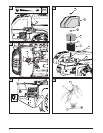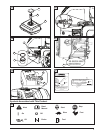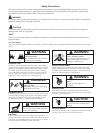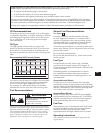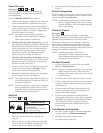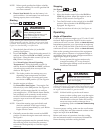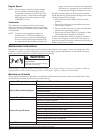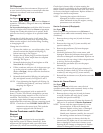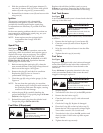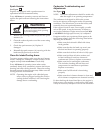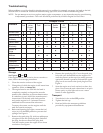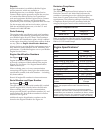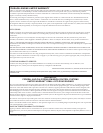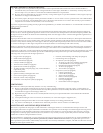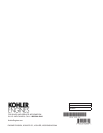
11
EN
Oil Disposal
Protect and respect the environment. Dispose of oil
at your local recycling center or municipal collection
location in accordance with local ordinances.
Change Oil
See Figures
1
,
2
,
3
, and
4
For a new engine, change oil aer the rst 5 hours of
operation. Thereaer, change oil aer every 100 hours
of operation.
For an overhauled engine, use Kohler 10W-30 service
class SJ or higher oil for the rst 5 hours of operation.
Change the oil aer this initial run-in period. Rell
with service class SJ or higher oil as specied in Oil
Type.
Change the oil while the engine is still warm. The
oil will ow freely and carry away more impurities.
Make sure the engine is level when lling, checking,
or changing the oil.
Change the oil as follows:
1. To keep dirt, debris, etc., out of the engine, clean
the area around the dipstick/oil ll plug (F)
before removing it. See Figure 1.
2. Remove the oil drain plug (E) and the dipstick/
oil ll plug (F). Allow ample time for complete
drainage. See Figure 1.
3. Reinstall the drain plug (E) and tighten to 17.6
N·m (13 . lb.). See Figure 1.
4. Fill the crankcase with new oil of the proper type,
up to the point of overowing the ller neck.
(Refer to Oil Type). Always check the level before
adding more oil.
5. Reinstall the dipstick/oil ll plug (A) and gasket
(B), and tighten securely. See Figures 2 and 3.
NOTE: Over-tightening the dipstick/oil ll plug (A)
will distort the gasket (C) and may cause oil
weeping. See Figure 4.
Oil Sentry™
Some engines are equipped with an optional Oil
Sentry™ switch. This switch is designed to prevent
the engine from being started in a low-oil or no-oil
condition. The Oil Sentry™ may not shut down
a running engine before damage occurs. In some
applications this switch may activate a warning signal.
NOTE: Check the oil level BEFORE EACH USE and
maintain to the correct level. This includes
engines equipped with Oil Sentry™.
Service Precleaner and Air Cleaner
Element
See Figure
15
These engines are equipped with a replaceable,
high-density paper air cleaner element (F). Some
engines are also equipped with a pre-oiled, foam
precleaner (D), which surrounds the paper element.
Check the air cleaner daily or before starting the
engine. Check for a buildup of dirt and debris around
the air cleaner system. Keep this area clean. Also check
for loose or damaged components. Replace all bent or
damaged air cleaner components.
NOTE: Operating the engine with loose or
damaged air cleaner components could
allow unltered air into the engine, causing
premature wear and failure.
Service Precleaner (If Equipped)
See Figure
15
Wash or replace the precleaner every 50 hours of
operation (more oen under extremely dusty or dirty
conditions).
1. Remove the top wing nut (A) and air cleaner
cover (B).
2. Remove the wing nut (C) (some models) and
special washer (E).
3. Remove the precleaner (D) from the paper
element (F).
4. Wash the precleaner (D) in warm water with
detergent. Rinse the precleaner thoroughly until
all traces of detergent are eliminated. Squeeze out
excess water (do not wring). Allow the precleaner
to air dry. Do not oil precleaner.
5. Reinstall the precleaner (D) over the paper
element (F).
6. Slide the precleaner (D) and paper element (F)
onto the air cleaner stud (G). Secure with special
washer (E) and wing nut (C) (some models).
7. Reinstall the air cleaner cover (B) and secure with
wing nut (A).
Service Air Cleaner Element
See Figure
15
Yearly or 100 hours (which ever comes rst) of
operation (more oen under extremely dusty or dirty
conditions), replace the paper element.
1. Remove the top wing nut (A) and air cleaner
cover (B). Remove the wing nut (C) (some
models) and special washer (E).
2. Separate the precleaner (D) from the element (F)
and service as outlined in Service Precleaner.
NOTE: Do not wash the paper element (F) or use
pressurized air, as this will damage the
element. Replace a dirty, bent, or damaged
element with a genuine Kohler element.
Handle new elements carefully; do not use if
the sealing surfaces are bent or damaged.
3. When servicing the air cleaner, check the air
cleaner base (H). Make sure it is secured and not
bent or damaged. Check the air cleaner cover/
housing (B) for damage or improper t. Replace
all bent or damaged air cleaner components.



